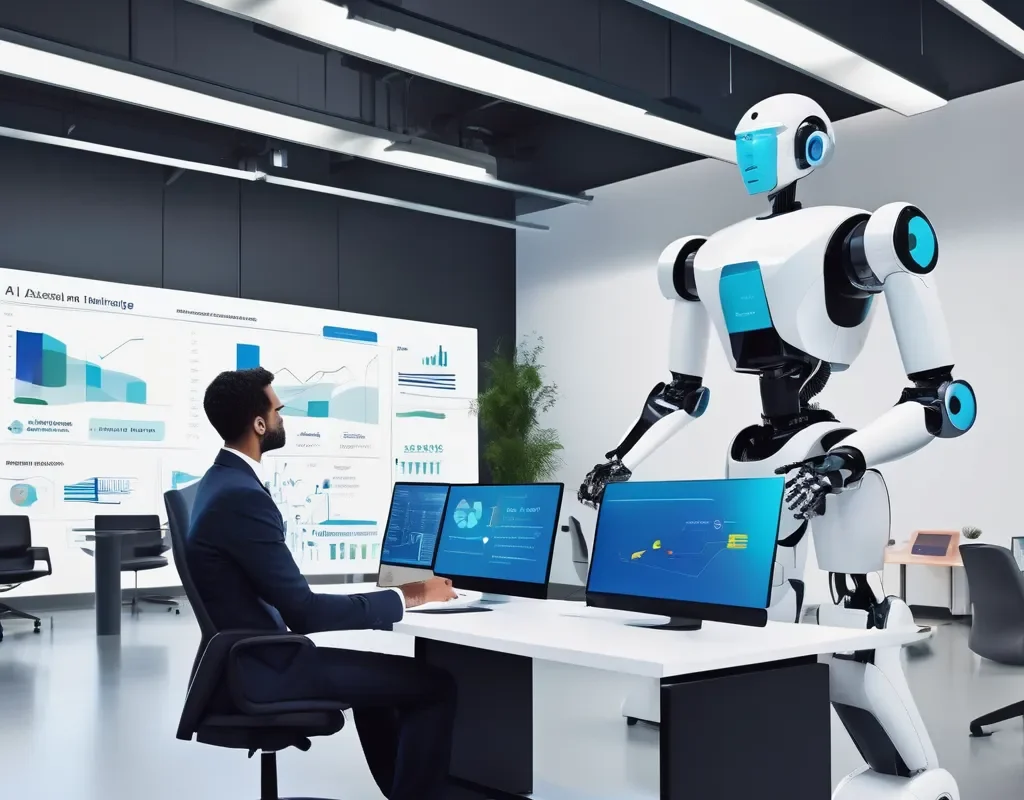In recent years, artificial intelligence (AI) has become a buzzword across numerous industries such as healthcare, finance, marketing, and transportation. However, one area where AI’s impact is especially profound is market research.
Market research is crucial for understanding consumer behavior, market trends, and the competitive landscape. Traditionally, it has been a time-consuming and costly process, relying heavily on manual methods like surveys, focus groups, and interviews. With the advent of AI, businesses now have a game-changing tool to streamline these processes, analyze vast amounts of data, and make faster, more informed decisions.
This blog dives into the role of artificial intelligence and market research, explores its applications, and examines the evolving impact on the job market. Whether you’re a business leader looking to integrate AI into your market research strategy or a professional exploring the future of AI-driven industries, this post offers valuable insights into how AI is shaping the future of business intelligence.
Understanding Artificial Intelligence (AI)
Before diving into its role in market research, it’s important to understand what artificial intelligence actually is. In simple terms, AI refers to the creation of human-like intelligence in machines, enabling them to think, learn, and solve problems on their own. Unlike traditional software that follows strict instructions, AI systems can adapt, learn, and make decisions based on big data—without requiring constant human intervention.
AI comprises several subfields, such as:
- Machine Learning (ML): A branch of AI that enables algorithms to improve their performance by being exposed to more data.
- Natural Language Processing (NLP): AI’s ability to understand, interpret, and interact with human language.
- Neural Networks: Models inspired by the human brain, enabling AI systems to recognize patterns and make predictions.
In the context of market research, AI is used to analyze large datasets, perform repetitive tasks with minimal error, and provide actionable insights more effectively than traditional methods.
The Role of Artificial Intelligence in Market Research

Market research involves the collection and analysis of data to understand consumer preferences, market trends, and competitive dynamics. Traditionally, this has involved time-consuming surveys, interviews, and focus groups. These methods have limitations, such as the cost of data collection, human bias in interpreting results, and the time it takes to analyze data. Artificial intelligence and market research are now working hand-in-hand to address these challenges, offering several advantages:
1. Data Collection and Automation
AI significantly enhances the process of data collection. Traditional methods of gathering market insights, such as surveys, require considerable human involvement, making the process slow and expensive. AI, however, automates data gathering by scraping real-time information from online platforms like social media, websites, and customer reviews. AI can even extract structured data from unstructured sources such as images, videos, and text.
For instance, AI algorithms can scan millions of social media posts to determine public sentiment around a brand or product. This means businesses can collect far more data points in less time compared to traditional research methods, leading to richer insights and more timely decision-making.
2. Sentiment Analysis
One of the most valuable applications of AI in market research is sentiment analysis. This technique allows businesses to gauge consumer opinions and emotions by analyzing online content such as social media posts, reviews, blog entries, and news articles.
AI-driven sentiment analysis helps businesses understand whether the public’s feelings towards a brand or product are positive, negative, or neutral. For example, after launching a new product, companies can use AI tools to analyze consumer reactions in real-time. This immediate feedback helps brands adjust their strategies quickly and avoid costly mistakes.
3. Predictive Analytics and Forecasting
AI is exceptionally good at analyzing vast datasets to identify patterns, which makes it invaluable for predictive analytics. Predictive analytics uses historical data to forecast future trends, helping businesses anticipate market shifts, customer behavior, and product demand.
For example, AI can analyze past purchasing behavior to predict future sales trends, customer preferences, or emerging market trends. Businesses can use these insights to forecast demand, optimize inventory management, or tailor marketing efforts to specific customer segments. This proactive approach is far more efficient than reacting to trends after they have already emerged.
4. Personalization and Consumer Insights
Personalization is becoming a vital aspect of modern business strategy, and AI is at the heart of this transformation. AI analyzes consumer data—such as browsing history, past purchases, and engagement patterns—to offer highly personalized experiences.
For example, streaming services like Netflix use AI to recommend shows or movies based on a user’s previous viewing habits. Similarly, e-commerce platforms like Amazon use AI to recommend products based on past searches and purchases. This level of personalization helps businesses target the right products to the right people, leading to higher conversion rates and customer satisfaction.
5. Improving Decision Making and Strategy
AI’s ability to process and analyze vast amounts of data helps businesses gain insights that drive better decision-making. Traditional methods of market research can often miss subtle patterns, but AI systems excel at identifying trends that may otherwise go unnoticed.
For instance, AI-powered market research tools can provide actionable insights into emerging consumer preferences, competitive gaps, or market shifts. This allows businesses to adapt their strategies quickly, test multiple approaches through A/B testing, and optimize their marketing campaigns. AI enables companies to make data-driven decisions, enhancing efficiency and improving customer engagement.
Artificial Intelligence in Research and the Job Market
While AI is revolutionizing market research, its impact extends far beyond data analysis. AI is also reshaping the job market. The rise of AI technologies is creating new job roles, shifting skill requirements, and transforming how businesses operate.
AI Research and Innovation
Artificial intelligence research is a rapidly expanding field. Researchers are constantly developing new algorithms and techniques to improve AI’s capabilities. For instance, there is ongoing work to enhance deep learning models, which allow machines to learn from massive datasets, and to improve natural language processing, which makes it easier for computers to understand and interact with human language.
In the context of market research, AI research is essential for developing algorithms that are both more effective and more ethical. As businesses increasingly rely on AI to drive decision-making, the need for AI researchers who can ensure that AI systems are transparent, fair, and free from bias becomes critical.
Impact on the Job Market
The rise of AI in market research and other industries is dramatically changing the job market. Several key trends are emerging:
- Creation of New Jobs: As AI tools and systems become more integrated into business operations, there is a growing demand for professionals who can build, maintain, and improve these technologies. Key roles include data scientists, machine learning engineers, AI specialists, and AI researchers.
- Skills Shift: While AI is automating routine tasks, it is also changing the nature of existing jobs. Professionals in fields like marketing, data analytics, and market research must now develop expertise in AI technologies. Understanding machine learning, data analysis, and AI tools is becoming increasingly important for career advancement.
- Job Displacement: While AI is creating new job opportunities, it’s also replacing certain roles, particularly those that involve repetitive or manual tasks. For example, AI-powered chatbots are replacing customer service representatives, and automated data analysis tools are reducing the need for traditional market researchers. However, this displacement is not necessarily negative—it often paves the way for higher-level strategic roles focused on managing and optimizing AI systems.
- Improved Collaboration: In the future, AI is likely to complement human decision-making rather than replace it entirely. Professionals who can combine human creativity, intuition, and strategy with the analytical power of AI will be highly sought after. These hybrid roles require individuals who can collaborate effectively with AI systems to solve complex business challenges.

The Future of AI in Market Research
The future of AI in market research is incredibly promising. As AI technology continues to evolve, its role in market research will expand, providing businesses with deeper insights and more accurate predictions. Here are some key trends to watch:
- Integration with Other Technologies: AI will increasingly work alongside other emerging technologies like the Internet of Things (IoT), big data, and blockchain to provide businesses with even richer data and more powerful insights. The combination of these technologies will allow companies to collect more comprehensive data and make more informed decisions.
- More Personalization: As AI becomes more sophisticated, businesses will be able to offer even more personalized experiences for their customers. With better insights into customer preferences and behaviors, companies can create tailored marketing strategies and product offerings that drive higher engagement and satisfaction.
- Ethical AI: As AI becomes more integrated into business operations, there will be greater emphasis on ensuring that AI systems are transparent, fair, and unbiased. Companies will need to prioritize ethical AI practices to maintain consumer trust and avoid potential negative consequences.

Conclusion
Artificial intelligence is transforming the landscape of market research by improving data collection, analysis, and decision-making. With AI’s ability to process large volumes of data, forecast future trends, and deliver personalized insights, businesses can make more informed decisions faster than ever before. However, the rise of AI also has significant implications for the job market, creating new roles while reshaping existing ones.
As AI continues to advance, businesses must embrace this technology to unlock new opportunities, streamline operations, and gain a competitive edge. For professionals, acquiring skills in AI, data analysis, and machine learning will be crucial to staying ahead in an increasingly AI-driven world.
The integration of AI into market research is just the beginning of a broader revolution in business strategy and job markets. Those who understand and adapt to these changes will be well-positioned to thrive in the AI-powered future and Artificial Intelligence and Market Research.



Заказать Хавейл – только у нас вы найдете разные комплектации. Быстрей всего сделать заказ на хавал джолион официальный дилер цены можно только у нас!
[url=https://jolion-ufa1.ru]хавал джулиан купить в уфе[/url]
haval jolion комплектации и цены уфа – [url=https://jolion-ufa1.ru/]http://jolion-ufa1.ru/[/url]
спасибо, если вам нужна помощь, связанная с этим постом, пожалуйста, свяжитесь с нами